最新英语诗歌押韵
有押韵的英文小诗
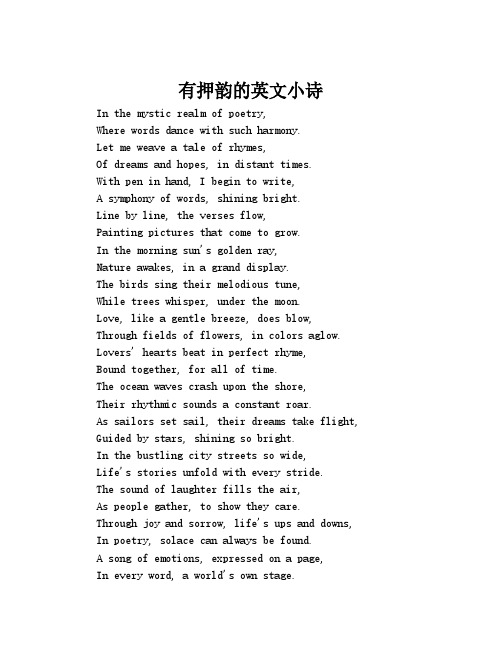
有押韵的英文小诗In the mystic realm of poetry,Where words dance with such harmony.Let me weave a tale of rhymes,Of dreams and hopes, in distant times.With pen in hand, I begin to write,A symphony of words, shining bright.Line by line, the verses flow,Painting pictures that come to grow.In the morning sun's golden ray,Nature awakes, in a grand display.The birds sing their melodious tune,While trees whisper, under the moon.Love, like a gentle breeze, does blow, Through fields of flowers, in colors aglow. Lovers' hearts beat in perfect rhyme,Bound together, for all of time.The ocean waves crash upon the shore,Their rhythmic sounds a constant roar.As sailors set sail, their dreams take flight, Guided by stars, shining so bright.In the bustling city streets so wide,Life's stories unfold with every stride.The sound of laughter fills the air,As people gather, to show they care.Through joy and sorrow, life's ups and downs, In poetry, solace can always be found.A song of emotions, expressed on a page,In every word, a world's own stage.So let us revel in this poetic art,Let the rhythm of words touch every heart.For in this realm, where rhymes do dwell,Lies the power of tales to weave and tell. Endless possibilities, in every line,The beauty of poetry, truly divine.In the realm of words, where dreams take flight, A poem's magic, forever ignites.。
学生英文自创押韵诗14句
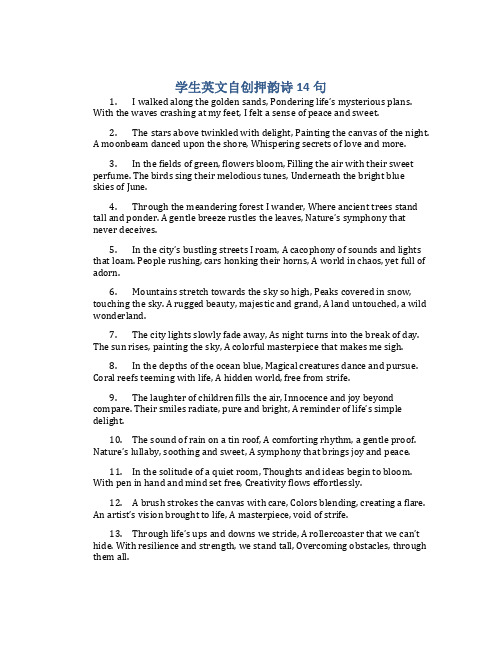
学生英文自创押韵诗14句1.I walked along the golden sands, Pondering life’s mysterious plans. With the waves crashing at my feet, I felt a sense of peace and sweet.2.The stars above twinkled with delight, Painting the canvas of the night.A moonbeam danced upon the shore, Whispering secrets of love and more.3.In the fields of green, flowers bloom, Filling the air with their sweet perfume. The birds sing their melodious tunes, Underneath the bright blue skies of June.4.Through the meandering forest I wander, Where ancient trees stand tall and ponder. A gentle breeze rustles the leaves, Nature’s symphony that never deceives.5.In the city’s bustling streets I roam, A cacophony of sounds and lights that loam. People rushing, cars honking their horns, A world in chaos, yet full of adorn.6.Mountains stretch towards the sky so high, Peaks covered in snow, touching the sky. A rugged beauty, majestic and grand, A land untouched, a wild wonderland.7.The city lights slowly fade away, As night turns into the break of day. The sun rises, painting the sky, A colorful masterpiece that makes me sigh.8.In the depths of the ocean blue, Magical creatures dance and pursue. Coral reefs teeming with life, A hidden world, free from strife.9.The laughter of children fills the air, Innocence and joy beyond compare. Their smiles radiate, pure and bright, A reminder of life’s simple delight.10.The sound of rain on a tin roof, A comforting rhythm, a gentle proof. Nature’s lullaby, soothing and sweet, A symphony that brings joy and peace.11.In the solitude of a quiet room, Thoughts and ideas begin to bloom. With pen in hand and mind set free, Creativity flows effortlessly.12. A brush strokes the canvas with care, Colors blending, creating a flare. An artist’s vision brought to life, A ma sterpiece, void of strife.13.Through life’s ups and downs we stride, A rollercoaster that we can’t hide. With resilience and strength, we stand tall, Overcoming obstacles, through them all.14.As the day comes to an end, The sky ablaze with colors that transcend.A sunset’s beauty, a final farewell, A reminder that in this world we dwell.These 14 lines of rhyming poetry explore various aspects of nature, human emotions, and the beauty of the world around us. Each line captures a fleeting moment or a profound experience, offering a glimpse into the vastness and complexity of life.。
押韵的英语诗

九首押韵的英语诗1、The Swing秋千How do you like to go up in a swing,你喜欢荡一趟秋千,Up in the air so blue?置身于蓝蓝的晴空吗?Oh,I do think it the pleasantest thing啊,我认为这是小孩所能做到的Ever a child can do.最愉快的玩耍。
Up in the air and over the wall,越过墙外高踞天空,Till I can see so wide,直到我能望见如此广大的世界,River and trees and cattle and all河流、树木、牛群,Over the countryside----还有整个的乡村。
Till I look down on the garden green直到我俯瞰着翠绿的花园Down on the roof so brown----以及棕色的屋顶Up in the air I go flying again我又飞上天去,Up in the air and down!在天地间上下穿梭!2、Rain雨Rain is falling all around,雨儿在到处降落,It falls on field and tree,它落在田野和树梢,It rains on the umbrella here,它落在这边的雨伞上,And on the ships at sea.又落在航行海上的船只。
3、Never give up永不放弃Never give up,Never lose hope.永不放弃,永不心灰意冷。
Always have faith,It allows you to cope.永存信念,它会使你应付自如。
Trying times will pass,As they always do.难捱的时光终将过去,一如既往。
Just have patience,Your dreams will come true.只要有耐心,梦想就会成真。
最新英语诗歌押韵
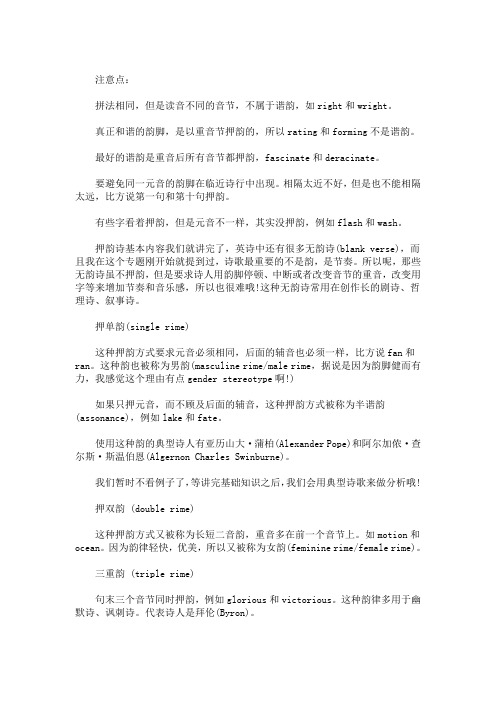
注意点:拼法相同,但是读音不同的音节,不属于谐韵,如right和wright。
真正和谐的韵脚,是以重音节押韵的,所以rating和forming不是谐韵。
最好的谐韵是重音后所有音节都押韵,fascinate和deracinate。
要避免同一元音的韵脚在临近诗行中出现。
相隔太近不好,但是也不能相隔太远,比方说第一句和第十句押韵。
有些字看着押韵,但是元音不一样,其实没押韵,例如flash和wash。
押韵诗基本内容我们就讲完了,英诗中还有很多无韵诗(blank verse),而且我在这个专题刚开始就提到过,诗歌最重要的不是韵,是节奏。
所以呢,那些无韵诗虽不押韵,但是要求诗人用韵脚停顿、中断或者改变音节的重音,改变用字等来增加节奏和音乐感,所以也很难哦!这种无韵诗常用在创作长的剧诗、哲理诗、叙事诗。
押单韵(single rime)这种押韵方式要求元音必须相同,后面的辅音也必须一样,比方说fan和ran。
这种韵也被称为男韵(masculine rime/male rime,据说是因为韵脚健而有力,我感觉这个理由有点gender stereotype啊!)如果只押元音,而不顾及后面的辅音,这种押韵方式被称为半谐韵(assonance),例如lake和fate。
使用这种韵的典型诗人有亚历山大·蒲柏(Alexander Pope)和阿尔加侬·查尔斯·斯温伯恩(Algernon Charles Swinburne)。
我们暂时不看例子了,等讲完基础知识之后,我们会用典型诗歌来做分析哦!押双韵 (double rime)这种押韵方式又被称为长短二音韵,重音多在前一个音节上。
如motion和ocean。
因为韵律轻快,优美,所以又被称为女韵(feminine rime/female rime)。
三重韵 (triple rime)句末三个音节同时押韵,例如glorious和victorious。
押韵的英文诗歌(精选10首)

押韵的英文诗歌押韵的英文诗歌(精选10首)中国个古诗,或者现代诗,有我们自己的格调韵律。
英文诗也有它自己独特的韵律。
因为我们的语言构成的不同,在押韵上的领会也是不同的,也许一篇英文诗翻译成汉语就会可能失去它原有的味道,不如就着原诗,领略一番。
下面是小编整理收集的押运英文诗歌,欢迎阅读!押韵的英文诗歌1《Humpty-dumpty》Humpty-dumpty sat on a wall.Humpty-dumpty had a great fall.All the King's horsesAnd all the King's menCan not put Humpty-dumpty together again.押韵的英文诗歌2《Never give up,》Never give up,Never lose hope.Always have faith,It allows you to cope.Trying times will pass,As they always do.Just have patience,Your dreams will come true.So put on a smile,You'll live through your pain.Know it will pass,And strength you will gain押韵的英文诗歌3《Trying》I thought it boringDo nothing I wantTryingTrying and tryingI found it boringEndingI thought it interestingDo what I wantDoingDoing and doingI found it excitingContinuing押韵的英文诗歌4《keep positive》If you want to keep positiveIf you hate being negativeJust come down to my dreamAnd come down with a smileIt is my own worldI will show you the methodTo be happy and positiveAnd say goodbye to negativeThere has everythingHas all the happy thingYou just need to enjoyAnd leave with a smileAlthough you aren't hereWith no my dreams thereDon't forget to smileAnd never lose smile押韵的'英文诗歌5《by Thomas Heise》My birthright I have traded for a petal dressand a summer eulogy. I have pawned my soulfor this opal ring, the color of a pale, taxidermied eye.If I could carry calla lilies on my shoulder once morelike an umbrella in daylight, I would lean themon the cemetery gate and sleep until the groundskeeper found me.For some of us, beauty is carcinoma.The saint‘s stigmata is god’s rose, bestowedfor forgoing a human lover, who will, of course, die.I died last year. My mother made her tears into crystalearrings and clipped them to my ears.“Son, you willpay for your sin,“ my father spoke from his throne of glass.Stars burn a sharp, white nacre until they evaporate.The moon‘s flamingo unfolds her iodine wings over the broken city.My necropolis. My teeth are the fruit of your olive tree.押韵的英文诗歌6《EpistlefromMrs.Yonge to Her Husband》by Lady Mary Wortley MontaguThink not this paper comes with vain pretenseTo move your pity, or to mourn th' offense.Too well I know that hard obdurate heat;No softening mercy there will take my part,Nor can a woman's arguments prevail,When even your patron's wise example fails.But this last privilege I still retain;Th' oppressed and injured always may complain Too, too severely laws of honor bindThe weak submissive sex of womankind.If sighs have gained or force compelled our hand,Deceived by art, or urged by stern command,Whatever motive binds the fatal tie,The judging world expects our constancy.Just heaven!(for sure in heaven does justice reign,Though tricks below that sacred name profane)To you appealing I submit my cause,Nor fear a judgment from impartial laws.All bargains but conditional are made;The purchase void, the creditor unpaid;Defrauded servants are from service free;A wounded slave regains his liberty.For wives ill used no remedy remains,To daily racks condemned, and to eternal chains.From whence is this unjust distinction grown?Are we not formed with passions like your own? Nature with equal fire our souls endued,Our minds as haughty, and as warm as our blood;O'er the wide world your pleasures you pursue,The change is justified by something new;But we must sigh in silence——and be true.Our sex's weakness you expose and blame(Of every prattling fop the common theme),Yet from this weakness you suppose is due Sublimer virtue that your Cato knew.Had heaven designed us trials so severe,It would have formed our tempers then to bear.And I have borne (oh what have I not borne!)The pang of jealousy, the insults of scorn.Wearied at length, I from your sight remove,And place my future hopes in secret love.In the gay bloom of glowing youth retired,I quit the woman's joy to be admired,With that small pension your hard heart allows,Renounce your fortune, and release your vows.To custom (though unjust) so much is due;I hide my frailty from the public view.My conscience clear, yet sensible of shame,My life I hazard, to preserve my fame.And I prefer this low inglorious stateTo vile dependence on the thing I hate——But you pursue me to this last retreat.Dragged into light, my tender crime is shown And every circumstance of fondness known.Beneath the shelter of the law you stand,And urge my ruin with a cruel hand,While to my fault thus rigidly severe,Tamely submissive to the man you fear.This wretched outcast, this abandoned wife,Has yet this joy to sweeten shameful life:By your mean conduct, infamously loose,You are at once my accuser and excuse.Let me be damned by the censorious prude (Stupidly dull, or spiritually lewd),My hapless case will surely pity findFrom every just and reasonable mind.When to the final sentence I submit,The lips condemn me, but their souls acquit.No more my husband, to your pleasures go,The sweets of your recovered freedom know.Go: court the brittle friendship of the great,Smile at his board, or at his levee wait;And when dismissed, to madam's toilet fly,More than her chambermaids, or glasses, lie,Tell her how young she looks, how heavenly fair,Admire the lilies and the roses there.Your high ambition may be gratified,Some cousin of her own be made your bride,And you the father of a glorious raceEndowed with Ch——l's strength and Low——r's face.押韵的英文诗歌7《Father's Day》父亲节Mary Frances Bogle玛丽·弗朗西斯·博格Over the years多年来,As we grow old,随着我们逐渐长大,We remember our father总想起我们的父亲,So brave and bold.那样勇敢而无畏。
英语简短押韵诗
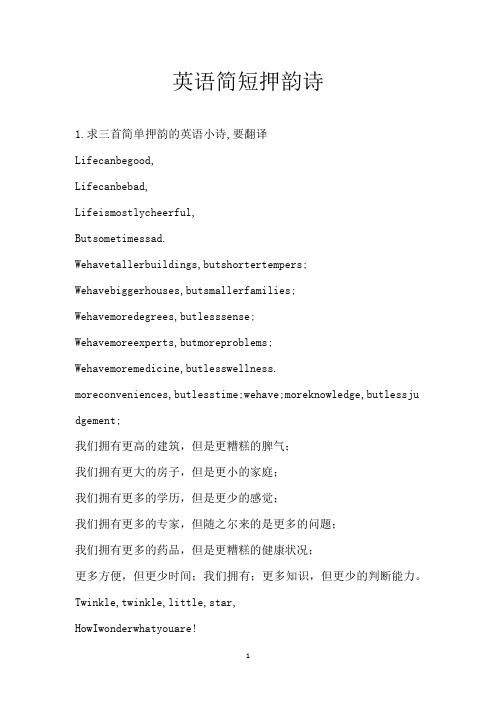
英语简短押韵诗1.求三首简单押韵的英语小诗,要翻译Lifecanbegood,Lifecanbebad,Lifeismostlycheerful,Butsometimessad.Wehavetallerbuildings,butshortertempers; Wehavebiggerhouses,butsmallerfamilies; Wehavemoredegrees,butlesssense;Wehavemoreexperts,butmoreproblems;Wehavemoremedicine,butlesswellness.moreconveniences,butlesstime;wehave;moreknowledge,butlessju dgement;我们拥有更高的建筑,但是更糟糕的脾气;我们拥有更大的房子,但是更小的家庭;我们拥有更多的学历,但是更少的感觉;我们拥有更多的专家,但随之尔来的是更多的问题;我们拥有更多的药品,但是更糟糕的健康状况;更多方便,但更少时间;我们拥有;更多知识,但更少的判断能力。
Twinkle,twinkle,little,star,HowIwonderwhatyouare!Upabovetheworldsohigh,Likeadiamondinthesky.Twinkle,twinkle,little,star,HowIwonderwhatyouare!一闪一闪亮晶晶,漫天都是小星星我想知道你身形,高高挂在天空中,就像天上的钻石。
一闪一闪亮晶晶,漫天都是小星星我想知道你身形。
2.只要押韵的英文短诗我这个短,压韵,是情诗:ASpecialWorldAspecialworldforyouandmeAspecialbondonecannots eeItwrapsusupinitscocoonAndholdsusfiercelyinitswomb.Itsfing ersspreadlikefinespungoldGentlynestlingustothefoldLikesilke nthreaditholdsusfastBondslikethisaremeanttolast.Andthoughat timesathreadmaybreakAnewoneformsinitswakeTobinduscloserandk eepusstrongInaspecialworld,wherewebelong----------NeverHave IFallenYourlipsspeaksoftsweetnessYourtouchacoolcaressIamlos tinyourmagicMyheartbeatswithinyourchestIthinkofyoueachmorni ngAnddreamofyoueachnightIthinkofyourarmsbeingaroundmeAndcan notexpressmydelightNeverhaveIfallenButIamquicklyonmywayYouholdaheartinyourhandsThathasneverbeforebeengivenaway。
简单英文押韵诗带翻译_短篇诗歌欣赏

简单英文押韵诗带翻译_短篇诗歌欣赏英语诗歌往往寄托着作者浓烈的情感,有些诗歌既唯美动人,又感人肺腑,今天店铺在这里为大家介绍一些简单英文押韵诗带翻译,希望大家会喜欢这些英语诗歌!简单英文押韵诗带翻译篇一后宫词泪湿罗巾梦不成夜深前殿按歌声红颜未老恩先断斜倚熏笼坐到明The DesertedHer kerchief soaked with tears, she can nor dream nor sleep, But overhears band music waft when night is deep.Her rosy face outlasts the favour of the king;She leans on her perfumed bed till morning birds sing.简单英文押韵诗带翻译篇二If I were to fall in love,It would have to be with you.如果说我已陷入情网;我的情人就是你;Your eyes, your smile,The way you laugh,你的眼睛,你的微笑;你的笑脸;The things you say and do.Take me to the places,My heart never knew.你说的一切,你做的一切;让我的心迷失了方向;So, if I were to fall in love,It would have to be with you所以,如果说我已陷入情网;我的爱人就是你。
简单英文押韵诗带翻译篇三Best wishes for the year to come!恭贺新禧!Good luck in the year ahead!祝吉星高照!May you come into a good fortune!恭喜发财!Live long and proper!多福多寿!May many fortunes find their way to you!祝财运亨通!I want to wish you longevity and health!愿你健康长寿!Take good care of yourself in the year ahead.请多保重!Wishing you many future successes.祝你今后获得更大成就。
英语押韵小诗

英语押韵小诗
英语押韵小诗示例如下:
The wind blows through the trees,
The leaves rustle in the breeze.
The sound of birds chirping,
A gentle rhythm in the air.
The sun shines bright,
The sky a beautiful blue.
The flowers in bloom,
A vibrant display of life.
The air is fresh and clean,
The earth is a beautiful place.
We must take care of nature,
To keep it beautiful forever.
拓展:
押韵是一种技巧,可以让诗歌的韵律更加优美。
在英语诗歌中,押韵可以使诗歌的节奏感更加强烈,同时也可以增加诗歌的美感。
不同的押韵方式有不同的效果,例如,同音韵、近音韵、反音韵、重音韵等。
在创作英语诗歌时,选择合适的押韵方式可以使得诗歌更加优美动人。
简单的押韵英文诗歌欣赏

简单的押韵英文诗歌欣赏英文诗歌有着丰厚的文化底蕴和历史文化渊源,读起来朗朗上口,且韵律优美,便于记忆。
店铺整理了简单的押韵英文诗歌,欢迎阅读!简单的押韵英文诗歌篇一爱我少一点爱我久一点Is the burden of my song?我歌唱永恒的爱情Love that is too hot and strong如果爱得太炙热Burneth soon to waste.它将很快燃烧成灰烬Still, I would not have thee cold但也不要对我冰冷Not too backward ,nor too bold不要爱得太羞怯,也不要爱得太狂热Love that lasteth till its old不要让爱的花朵那么快就凋谢Fadeth not in haste.我要你爱我一直到老Love me little ,Love me long爱我少一点,爱我久一点Is the burden of my song.我歌唱永恒的爱情If thou love me too much,如果爱我太多It will not prove me as true as totlch;它不可能像金石那样永恒Love me little ,more than such,爱我少一点我更愿意For I fear the end.只因我怕爱会失去I am with little well content,一点儿我就感到幸福And a little from thee sent一点儿就会让我满意Is enough, with true intent只要你是真心真To be steadfast friend.我们的爱至死不渝简单的押韵英文诗歌篇二THE SCENT OF SPRING春天的味道The village is full of the colour of white, and noises滿溝的白,滿溝的吵鬧Acacia flowers are blooming, attracting the wings of bees 洋槐花開了,它讓蜜蜂的翅膀To be covered with pollens of the sunshine沾滿了陽光的花粉If you mix acacia flowers with flour and steam it—把洋槐花和著麥面蒸熟——We take a short cut to get ahead of the bees我們抄捷徑趕在蜜蜂前頭And smell the scent of spring嘗到了春天的味道“Acacia honey, acacia honey—“ Beekeepers“槐花蜜槐花蜜——”養蜂人Prolongs his cry在樓下叫賣的聲音拖得很長And the road from to the beehives are prolonged as well像從洋槐花到蜂巢的路一樣長简单的押韵英文诗歌篇三生活之中不要等Don't wait for a smile to be nice.不要等到了一个笑容,才表现出友善Don't wait to be loved, to love.不要等被爱之后,才去爱Don't wait to be lonely, to recognize the value of a friend.不要等到寂寞了,才明白朋友的价值Don't wait for the best job, to begin to work.不要非等到一份最好的工作,才开始工作Don't wait to have a lot, to share a bit.不要等得到了很多,才开始分享Don't wait for the fall, to remember the advice.不要等到失败后,才想起别人的忠告Don't wait for pain, to believe in prayer.不要等到受伤了,才愿意祈祷Don't wait to have time, to be able to serve.不要等到有时间,才去付出Don't wait for anybody else pain, to ask for apologies...不要等别人受伤了,才来乞求原谅... neither separation to make it up.不要等到分开了,才想到去挽回Don't wait... Because you don't know how long it will take.不要等待,因为你不知道需要等待多长时间。
英语诗歌作文简单押韵
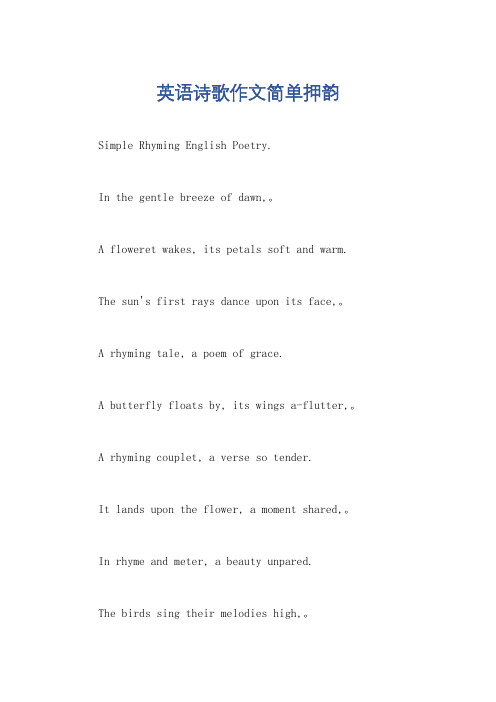
英语诗歌作文简单押韵Simple Rhyming English Poetry.In the gentle breeze of dawn,。
A floweret wakes, its petals soft and warm. The sun's first rays dance upon its face,。
A rhyming tale, a poem of grace.A butterfly floats by, its wings a-flutter,。
A rhyming couplet, a verse so tender.It lands upon the flower, a moment shared,。
In rhyme and meter, a beauty unpared.The birds sing their melodies high,。
Echoing through the trees, a rhyming cry.Their songs entwine with nature's breath,。
A rhyming ode to life, a melodious death.The waves crash upon the shore,。
In rhyming surges, a rhythmic roar.The sand beneath their feet is soft and fine,。
A rhyming line, a meter so divine.The children laugh and play, their joy so free,。
A rhyming refrain, a happy melody.Their laughter echoes through the air,。
A rhyming joy, a childhood memory.The moon rises in the night sky,。
押韵的英文诗歌
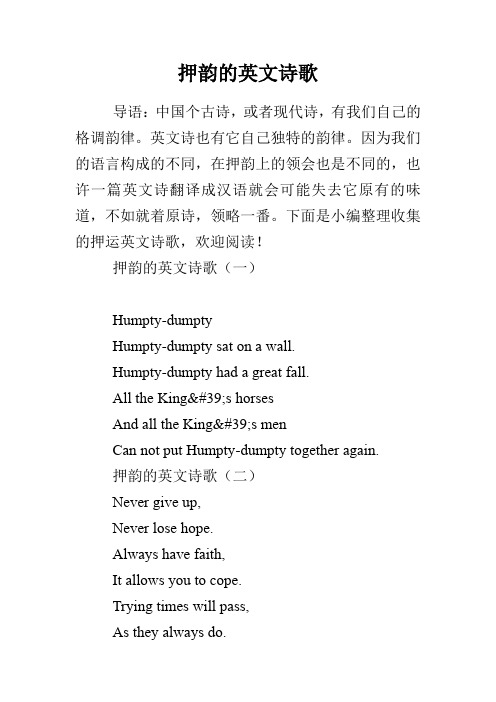
押韵的英文诗歌导语:中国个古诗,或者现代诗,有我们自己的格调韵律。
英文诗也有它自己独特的韵律。
因为我们的语言构成的不同,在押韵上的领会也是不同的,也许一篇英文诗翻译成汉语就会可能失去它原有的味道,不如就着原诗,领略一番。
下面是小编整理收集的押运英文诗歌,欢迎阅读!押韵的英文诗歌(一)Humpty-dumptyHumpty-dumpty sat on a wall.Humpty-dumpty had a great fall.All the King's horsesAnd all the King's menCan not put Humpty-dumpty together again.押韵的英文诗歌(二)Never give up,Never lose hope.Always have faith,It allows you to cope.Trying times will pass,As they always do.Just have patience,Your dreams will come true.So put on a smile,You'll live through your pain. Know it will pass,And strength you will gain押韵的英文诗歌(三)I thought it boringDo nothing I wantTryingTrying and tryingI found it boringEndingI thought it interestingDo what I wantDoingDoing and doingI found it excitingContinuing押韵的英文诗歌(四)If you want to keep positiveIf you hate being negativeJust come down to my dream And come down with a smile It is my own worldI will show you the method To be happy and positiveAnd say goodbye to negative There has everythingHas all the happy thingYou just need to enjoyAnd leave with a smile Although you aren't here With no my dreams thereDon't forget to smile And never lose smile押韵的英文诗歌(五)Twinkle,twinkle,little,star, How I wonder what you are! Up above the world so high, Like a diamond in the sky. Twinkle,twinkle,little,star, How I wonder what you are! 押韵的英文诗歌(六)My darling, my lover, my beautiful wife:Marrying you has screwed up my lifeI see your face when I am dreaming.That's why I always wake up screaming.Kind, intelligent, loving and hot;This describes everything you are not.Love may be beautiful, love may be bliss,But I only slept with you 'cause I was pissed.I thought that I could love no other—that is until I met your other.Roses are red, violets are blue, sugar is sweet, and so are you.But the roses are wilting, the violets are dead,the sugar bowl's empty and so is your head.I want to feel your sweet emace;But don't take that paper bag off your face.I love your smile, your face, and your eyesDamn, I'm good at telling lies!My love, you take my eath away.What have you stepped in to smell this way?My feelings for you no words can tell,Except for maybe “Go to hell.”What inspired this amorous rhyme? Two parts vodka, one part lime.。
描写动物的英语押韵诗

描写动物的英语押韵诗以下是一首描写动物的英语押韵诗:Tyger!Tyger!burning bright,In the forests of the night,What immortal hand or eye Could frame thy fearful symmetry?In what distant deeps or skies Burnt the fire of thine eyes!On what wings dare he aspire?What the hand,dare sieze the fire?And what shoulder,and what art,Could twist the sinews of thy heart?And when thy heart began to beat,What dread hand?and what dread feet?What the hammer?what the chain?In what furnace was thy brain?What the anvil? what degree despiteful fire?deserted free?Who hath mingled the cup of Soma,With the waters of Zam-ma?In what wrestle souncèd theela,When the Bear invaded Soma?In whatfountain or what cave Imbibed they the pencil?whose wrists are the mightier For the dark to support so weighty a pen?Tyger!Tyger!burning bright,In the forests of the night,What immortal hand or eye, Dare frame thy fearful symmetry?。
押韵的英文小诗并圈出韵脚

押韵的英文小诗英语作文1The flowers bloom, a colorful show.Filling the air with sweetest care.Collecting nectar, no time to sigh.Bringing life to this wonderful week.The beach awaits with sunny grace. Crashing on the sand, day and night.Bathing all in its golden lot.In this season, joy has its way.In nature's arms, we find our crew.In our hearts, these memories are gold.2Shining bright when the night is high.The joy we share will never go away. Holding hands, not letting go of fun.The bond of friendship is always here.Each step we take, we know.For friendship makes it all so clear.The memories made, we won't let fall.This friendship is a treasure rare.3 The world awakes in hues so true. Nature's dance, a joyous room. Thunder roars, rain pours at night. Under the sun, hearts take their toll. Like dancers in a silent dance.The wind blows, a peaceful sign. Blanketing the world in silent might.A wonderland, beyond all ill.Each holds beauty, a tale to shine.A symphony, nature's gentle flow.4 Dreams Shine BrightDreams like stars give hope and light. Filling our hearts with endless ray. But with courage, we'll not complain. We'll keep striving, not say goodbye. We'll stand firm, not shed a tear. Burning bright, our spirits inspire.In the power of our dreaming.To the land where dreams flower.But our dreams, they are our guard.And reach the stars, shining so bright.5The meaning of life, a mystery profound and meek. To find the true self, alive and alive.Full of choices, sometimes confusing.Guiding me towards a purpose, not just falling. Discovering treasures of wisdom and prime. Shining bright, beyond any hem.Exploring the unknown, with hope as the quest. For within, lies the truth, come what may.。
the noon call 韵律诗
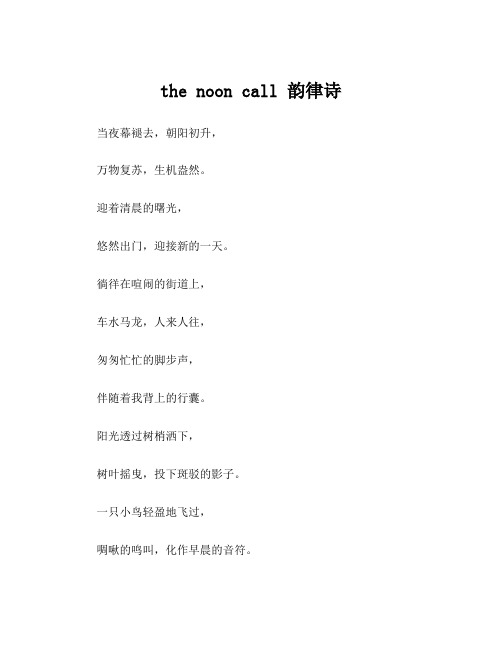
the noon call 韵律诗当夜幕褪去,朝阳初升,万物复苏,生机盎然。
迎着清晨的曙光,悠然出门,迎接新的一天。
徜徉在喧闹的街道上,车水马龙,人来人往,匆匆忙忙的脚步声,伴随着我背上的行囊。
阳光透过树梢洒下,树叶摇曳,投下斑驳的影子。
一只小鸟轻盈地飞过,啁啾的鸣叫,化作早晨的音符。
走进咖啡馆,点上一杯香浓的咖啡,热气腾腾,弥漫着诱人的香味。
静静品味,思绪如云,慢慢散开,在大脑中盘旋。
望向窗外,看着人们匆匆过往,一张张面孔,各自承载着故事。
生活的诗篇在这瞬间交错,互相交织,又独自绽放。
触摸着陶瓷杯的温度,心湖涟漪荡漾,思绪如潮。
午后阳光洒在身上,温暖如春,柔软如棉。
午时之音缓缓响起,震撼着灵魂,忘却尘世纷扰。
这不是岁月的喧嚣,而是灵魂的呼唤。
华彩的韵律,在心中绽放,诗意的旋律在耳边回荡。
不需言语,也能与音符对话,用心倾听,才能感悟其魅力。
音符跃动,仿佛有了生命,跳跃在乐谱间,奏响人生的乐章。
心灵为之沉醉,内心被感动,没有了语言,只有灵魂的对话。
伴随着和弦的拨动,琴弦如箭,射进心底。
智慧、痛苦、希望、欢乐,交织一起,诠释着人生的微妙。
午时之音,将寂寞打碎,化作寄托,为心灵抚慰。
无需语言的表达,音符才是最真挚的语言。
午后时光逐渐消退,音符的韵律渐行渐远。
明日之旅,亦将启程,将午时的感动,带入人生旅途。
午后的韵律,仅为瞬间,蓦然回首,已成过去。
然而回忆,将永恒存在,午后音符犹如昨日的明珠。
它们陪伴我,如同一直的朋友。
提醒着我,生活是一首美丽的曲子。
午后的韵律,不分国界、肤色、年龄。
它是美好的,它是心灵的伙伴。
因此,听完午后的韵律,步入真正的心灵自由。
与音符交融,带着音乐之翼,翱翔天空。
长年岁月,午时永恒,韵律的乐章永不停歇。
让我们共同奏响午后的乐章,在音符的轻吟中,融入美好生活的编写。
午后的韵律,是灵魂的呼唤,带来的是静谧的宁和。
懂得欣赏,也是一种境界,午后音符敲响人生的正门。
简单英文押韵诗带翻译_短篇诗歌欣赏(2)

简单英文押韵诗带翻译_短篇诗歌欣赏(2)优美英文短篇诗歌欣赏篇五Crossing the Bar 渡沙渚By Alfred TennysonSunset and evening star,And one clear call for me!And may there be no moaning of the bar,When I put out to sea,But such a tide as moving seems asleep,Too full for sound and foam,When That which drew form out the boundless deep Turns again home.Twilight and evening bell,And after that the dark!And may there be no sadness of farewell,When I embark;For though from out our bourne of Time and PlaceThe flood may bear me far,I hope to see my Pilot face to faceWhen I have crost the bar.渡沙渚阿尔费雷德;丁尼生夕阳下,闪疏星,召唤一声清朗!愿沙渚宁静,我将出海远航;潮汐如梦幻,涛声似止,浪花息;大海深处涌来,又悄然退却。
暮霭钟鸣,黑夜将笼罩!愿诀别无悲声,登舟起锚;千古洪流,时空无限,滔滔载我至远方;渡沙渚一线,泰然见领航优美英文短篇诗歌欣赏篇六Freedom 珍惜自由Of all the wonderful gifts that we've been given, one of the greatest is freedom.在众多的我们天生被赋予的美妙礼物中,自由是最伟大的礼物之一。
最新英语诗歌押韵
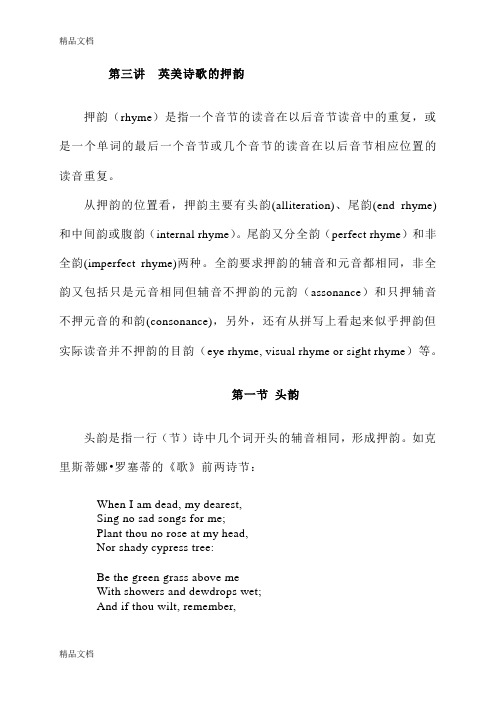
第三讲英美诗歌的押韵押韵(rhyme)是指一个音节的读音在以后音节读音中的重复,或是一个单词的最后一个音节或几个音节的读音在以后音节相应位置的读音重复。
从押韵的位置看,押韵主要有头韵(alliteration)、尾韵(end rhyme)和中间韵或腹韵(internal rhyme)。
尾韵又分全韵(perfect rhyme)和非全韵(imperfect rhyme)两种。
全韵要求押韵的辅音和元音都相同,非全韵又包括只是元音相同但辅音不押韵的元韵(assonance)和只押辅音不押元音的和韵(consonance),另外,还有从拼写上看起来似乎押韵但实际读音并不押韵的目韵(eye rhyme, visual rhyme or sight rhyme)等。
第一节头韵头韵是指一行(节)诗中几个词开头的辅音相同,形成押韵。
如克里斯蒂娜•罗塞蒂的《歌》前两诗节:When I am dead, my dearest,Sing no sad songs for me;Plant thou no rose at my head,Nor shady cypress tree:Be the green grass above meWith showers and dewdrops wet;And if thou wilt, remember,And if thou wilt, forget. 1(Christina Rossetti: Song)第一行的dead / dearest,第二行的sing / sad / songs,第五行的green / grass,第六行的with / wet押头韵。
又如柯尔律治的《古舟子咏》第103~第106行:The fair breeze blew, the white foam flew,The furrow followed free,We were the first that ever burstInto that silent sea. 2(Samuel Taylor Coleridge: The Rime of the Ancient Mariner)前三行里,头韵[f]重复七次。
动物小诗英文押韵
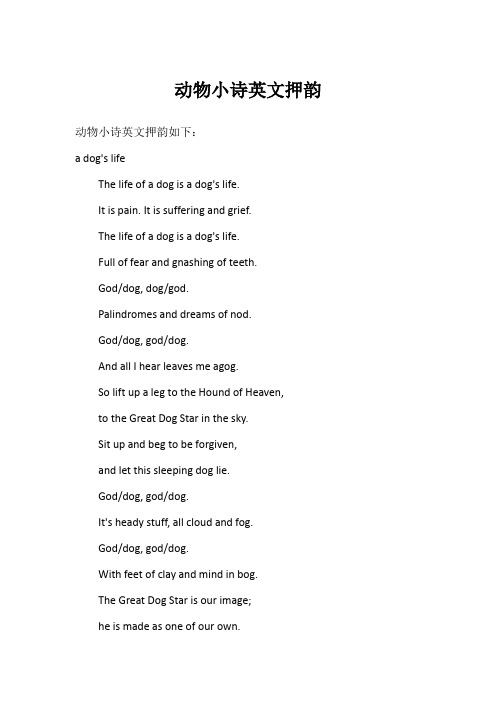
动物小诗英文押韵动物小诗英文押韵如下:a dog's lifeThe life of a dog is a dog's life.It is pain. It is suffering and grief.The life of a dog is a dog's life.Full of fear and gnashing of teeth.God/dog, dog/god.Palindromes and dreams of nod.God/dog, god/dog.And all I hear leaves me agog.So lift up a leg to the Hound of Heaven,to the Great Dog Star in the sky.Sit up and beg to be forgiven,and let this sleeping dog lie.God/dog, god/dog.It's heady stuff, all cloud and fog.God/dog, god/dog.With feet of clay and mind in bog.The Great Dog Star is our image;he is made as one of our own.He doesn't wear clothes and has a wet nose, and thinks nothing of sucking the bone. God/dog, god/dog.Speaks from high: a monologue.God/dog, god/dog.In cunning plans, we're only cogs.The life of a dog is a dog's life.It is cruel. It is brutal and brief.The life of a dog is a dog's life.Thrown a bone to atone like a thief.God/dog, god/dog.Like unicorns and go。
- 1、下载文档前请自行甄别文档内容的完整性,平台不提供额外的编辑、内容补充、找答案等附加服务。
- 2、"仅部分预览"的文档,不可在线预览部分如存在完整性等问题,可反馈申请退款(可完整预览的文档不适用该条件!)。
- 3、如文档侵犯您的权益,请联系客服反馈,我们会尽快为您处理(人工客服工作时间:9:00-18:30)。
第三讲英美诗歌的押韵押韵(rhyme)是指一个音节的读音在以后音节读音中的重复,或是一个单词的最后一个音节或几个音节的读音在以后音节相应位置的读音重复。
从押韵的位置看,押韵主要有头韵(alliteration)、尾韵(end rhyme)和中间韵或腹韵(internal rhyme)。
尾韵又分全韵(perfect rhyme)和非全韵(imperfect rhyme)两种。
全韵要求押韵的辅音和元音都相同,非全韵又包括只是元音相同但辅音不押韵的元韵(assonance)和只押辅音不押元音的和韵(consonance),另外,还有从拼写上看起来似乎押韵但实际读音并不押韵的目韵(eye rhyme, visual rhyme or sight rhyme)等。
第一节头韵头韵是指一行(节)诗中几个词开头的辅音相同,形成押韵。
如克里斯蒂娜•罗塞蒂的《歌》前两诗节:When I am dead, my dearest,Sing no sad songs for me;Plant thou no rose at my head,Nor shady cypress tree:Be the green grass above meWith showers and dewdrops wet;And if thou wilt, remember,And if thou wilt, forget. 1(Christina Rossetti: Song)第一行的dead / dearest,第二行的sing / sad / songs,第五行的green / grass,第六行的with / wet押头韵。
又如柯尔律治的《古舟子咏》第103~第106行:The fair breeze blew, the white foam flew,The furrow followed free,We were the first that ever burstInto that silent sea. 2(Samuel Taylor Coleridge: The Rime of the Ancient Mariner)前三行里,头韵[f]重复七次。
这个摩擦送气的清辅音模仿柔风轻涛的声音,创造出一种宁静的意境。
第四行里的两个[s]音宛如和风吹过沉寂海面而发出的咝咝声。
头韵在这里的使用,令读者有身临其境之感。
另外,中间韵blew / flew,first / burst,furrow / followed,尾韵free / sea 形成悦耳动听的韵味和节奏感。
再如莎士比亚编号为71的十四行诗前八行:No longer mourn for me when I am deadThan you shall hear the surly sullen bellGive warning to the world that I am fledFrom this vile world with vilest worms to dwell.Nay, if you read this line, remember notThe hand that writ it; for I love you so1当我离开人间,最亲爱的,/ 别为我哀歌悲切;/ 我的墓前不要栽玫瑰,/ 也不要柏树茂密;// 愿绿草覆盖我的身躯,/ 沾着湿润的灵珠雨水;/ 假如你愿意,就把我怀念,/ 假如你愿意,就把我忘却。
(徐安祥译)2好风吹送,浪花飞涌,/ 船行时留下纹路;/ 这幽静海面,在我们以前/ 从来没有人闯入。
(杨德豫译)That I in your sweet thoughts would be forgotIf thinking on me would make you woe. 3每行都有不同的头韵。
第一行为mourn / me,第二行为surly / sullen,第三行为warning / world,第四行为world / worm,第五行为read / remember,第八行为me / make和would / woe。
第二行、第三行和第五行为than / that / this,第七行和第八行为thoughts / thinking。
这样的不同首字母交替出现在一个诗节中,可以称为交叉头韵。
诗人在使用头韵时,还使用一种声音的重复,通过这种声音的重复表达一种独特的情感。
如多恩的《歌》:When thou sigh’st, thou sigh’st not windBut sigh’st my soul away;When thou weep’st, unkindly kind,My life’s blood doth decay.It cannot be,That thou lov’st me, as thou say’st,If in thine my life thou waste,Thou art the best of me. 4(John Donne: Song)此诗节使用的头韵有when / wind / weep / waste,sigh / soul / say,doth / decay,blood / be / best,thou / then / that等。
另外,在sigh、kindly、thine、my和life中有频繁的元音字母i,此音暗示悲伤和抑郁,加上它3有一天你会听到阴郁的钟声/ 向世人宣告我已逃离这污秽的世界/ 伴随最龌龊的蛆虫往另一世界安身,/ 我劝你千万不要为我而悲鸣。
/ 还有,你读这行诗的时候千万别记挂/ 这写诗的手,因为我爱你至深,/ 惟愿被忘却在你甜甜的思绪里,/ 我怕你想到我时会牵动愁心。
(辜正坤译)4你叹息时,叹的不是气,/ 而是叹掉了我的魂魄;/ 你哭泣时,好心却似恶意,/ 我的生命血液即枯竭。
/ 那就不可能,/ 像你所说的那样,你爱我,/ 如果你把我在你中的生命挥霍,/ 那是我最好的部分。
(傅浩译)是一个长元音,自然就减缓了诗行自然的快节奏运动,哀伤和抑郁之情得到了充分的表现。
同样的诗歌技巧也体现在爱伦•坡的《乌鸦》之中,如该诗的最后一节:And the Raven, never flitting, still is sitting, still is sittingOn the pallid bust of Pallas just above my chamber door;And his eyes have all the seeming of a demon that is dreaming,And the lamp-light o’er him streaming throws his shadow on the floor;And my soul from out that shadow that lies floating on the floorShall be lifted –nevermore! 5(Allan Poe: The Raven)此诗节中除了各行的头韵(still / sitting,pallid / Pallas,his / have,lamp / light,from / floating / floor),还有内韵(flitting / sitting,seeming / dreaming等),贯穿整个诗节的短元音[i]、[æ],长元音[i:]、[o:]和双元音[əu]生动地传达出了主人公的痛苦和绝望。
第二节尾韵尾韵(end rhyme)指行尾押韵单词最后的重读元音及其后面的辅音在读音上相同,而元音前面的辅音则不能相同。
也就是说,元音以及元音后面的辅音押韵,而元音前面的辅音则不押韵。
这种韵又被称为全韵(perfect rhyme)。
根据音节的数量,可分为单音节尾韵(single rhyme)、5而那乌鸦,永不飞离,依然栖息,依然栖息/ 在帕拉斯苍白的雕像上,就在我卧室的门楣上;/ 它那双眼宛如睡梦中的魔鬼的双眼;/ 它身上流泻的灯光把它的身影投落在地,/ 而我那灵魂将永不再——/ 从那地上晃动的阴影中升起。
(傅浩译)双音节尾韵(double rhyme)和三重音节尾韵(triple rhyme)。
单音节尾韵又称男韵或阳韵(masculine rhyme),是在诗行结尾重读音节之间出现的最普遍的押韵。
如米勒《在太平洋之滨》第二诗节:Above yon gleaming skies of goldOne lone imperial peak is seen;While gathered at his feet in greenTen thousand foresters are told.And all so still! So still the airThat duty drops the web of care. 6(Joaquin Miller: By the Pacific Ocean)第一、四行押韵,第二、三行押韵,第五、六行押韵,都是重读单音节。
虽然是单音节押韵,但它只要求一个音节押韵,而不要求押韵的一个音节是一个单音节单词。
例如叶芝《走过柳园》第一节:Down by the sally gardens my love and I did meet;She pass’d the sally gardens with little snow-white feet.She bid me take love easy, as the leaves grow on the tree;But I, being young and foolish, with her would not agree. 7(W. B. Yeats: Down by the Sally Gardens)这里第四行的agree就是一个双音节单词,它只在第二个音节上与前行的tree押韵,而且它是重读音节。
双音节韵又称女韵或阴韵(feminine rhyme),其基本特征是行尾单词最后两个音节押韵,其中倒数第二个音节是重读音节,而最后一个音6那边耀金光的天空上面,/ 只见有巍峨的孤峰一座;/ 在它葱绿的山脚旁,据说,/ 聚集有林中的居民一万。
/ 都这么静!空中静成这样,/ 使职责放下了操心之网。
(黄杲炘译)7在那柳枝花园下边,我遇上我的爱;/ 她走过柳枝花园,赤裸的纤足雪白。
/ 她要我轻松地相爱,像树儿抽着绿叶,/ 但是我年轻愚蠢,她的话我不同意。
(裘小龙译)节是非重读音节。
由于其读音是重读加非重读结构,因此它又称扬抑格韵(trochaic rhyme)。
